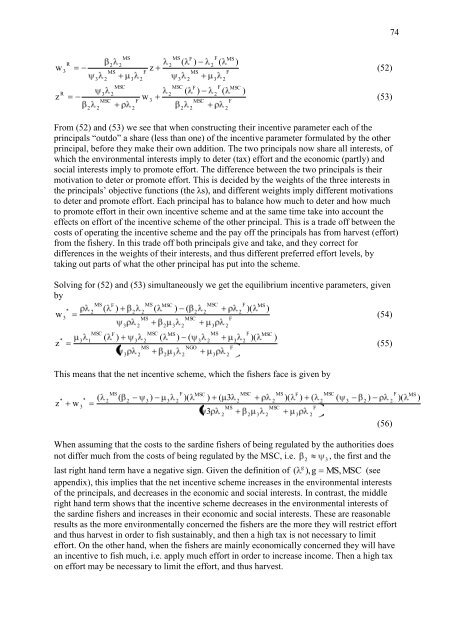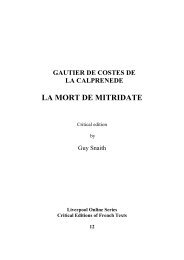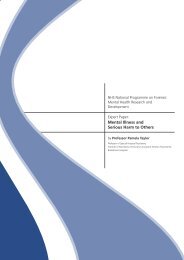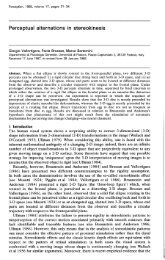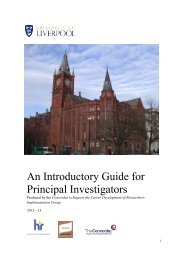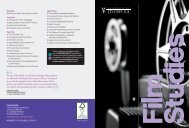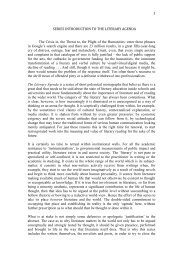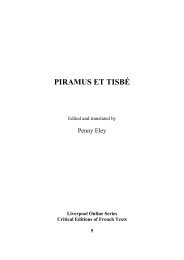Operational tools and adaptive management
Operational tools and adaptive management
Operational tools and adaptive management
You also want an ePaper? Increase the reach of your titles
YUMPU automatically turns print PDFs into web optimized ePapers that Google loves.
R<br />
3<br />
3<br />
2<br />
MS<br />
2<br />
MS<br />
2<br />
3<br />
F<br />
2<br />
MS<br />
2<br />
3<br />
MS<br />
2<br />
F<br />
2<br />
F<br />
MS<br />
( ) ( )<br />
w z<br />
(52)<br />
3<br />
F<br />
2<br />
R<br />
z<br />
MSC<br />
3 2<br />
MSC w F 3<br />
MSC<br />
2 (<br />
F<br />
)<br />
MSC<br />
F<br />
2 (<br />
MSC<br />
)<br />
F<br />
(53)<br />
2 2<br />
2<br />
2 2<br />
2<br />
From (52) <strong>and</strong> (53) we see that when constructing their incentive parameter each of the<br />
principals “outdo” a share (less than one) of the incentive parameter formulated by the other<br />
principal, before they make their own addition. The two principals now share all interests, of<br />
which the environmental interests imply to deter (tax) effort <strong>and</strong> the economic (partly) <strong>and</strong><br />
social interests imply to promote effort. The difference between the two principals is their<br />
motivation to deter or promote effort. This is decided by the weights of the three interests in<br />
the principals‟ objective functions (the λs), <strong>and</strong> different weights imply different motivations<br />
to deter <strong>and</strong> promote effort. Each principal has to balance how much to deter <strong>and</strong> how much<br />
to promote effort in their own incentive scheme <strong>and</strong> at the same time take into account the<br />
effects on effort of the incentive scheme of the other principal. This is a trade off between the<br />
costs of operating the incentive scheme <strong>and</strong> the pay off the principals has from harvest (effort)<br />
from the fishery. In this trade off both principals give <strong>and</strong> take, <strong>and</strong> they correct for<br />
differences in the weights of their interests, <strong>and</strong> thus different preferred effort levels, by<br />
taking out parts of what the other principal has put into the scheme.<br />
Solving for (52) <strong>and</strong> (53) simultaneously we get the equilibrium incentive parameters, given<br />
by<br />
MS F<br />
MS MSC<br />
MSC F MS<br />
* 2 ( ) 2 2 ( ) ( 2 2<br />
2 )( )<br />
w (54)<br />
3<br />
3<br />
3<br />
MS<br />
2<br />
MSC<br />
3 2<br />
MS<br />
2<br />
2<br />
2<br />
3<br />
3<br />
MSC<br />
2<br />
NGO<br />
2<br />
3<br />
MSC F<br />
MS<br />
MS<br />
F MSC<br />
* 3 1 ( ) ( ) ( 3 2 3 2 )( )<br />
z (55)<br />
This means that the net incentive scheme, which the fishers face is given by<br />
z<br />
*<br />
w<br />
*<br />
3<br />
(<br />
MS<br />
2<br />
(<br />
2<br />
3<br />
)<br />
3<br />
F<br />
2<br />
)(<br />
MSC<br />
)<br />
3<br />
3<br />
(<br />
F<br />
2<br />
F<br />
2<br />
3<br />
MS<br />
2<br />
MSC<br />
2<br />
2<br />
3<br />
MS<br />
2<br />
MSC<br />
2<br />
When assuming that the costs to the sardine fishers of being regulated by the authorities does<br />
not differ much from the costs of being regulated by the MSC, i.e. 2 3 , the first <strong>and</strong> the<br />
last right h<strong>and</strong> term have a negative sign. Given the definition of ( ), g MS,<br />
MSC<br />
g<br />
(see<br />
appendix), this implies that the net incentive scheme increases in the environmental interests<br />
of the principals, <strong>and</strong> decreases in the economic <strong>and</strong> social interests. In contrast, the middle<br />
right h<strong>and</strong> term shows that the incentive scheme decreases in the environmental interests of<br />
the sardine fishers <strong>and</strong> increases in their economic <strong>and</strong> social interests. These are reasonable<br />
results as the more environmentally concerned the fishers are the more they will restrict effort<br />
<strong>and</strong> thus harvest in order to fish sustainably, <strong>and</strong> then a high tax is not necessary to limit<br />
effort. On the other h<strong>and</strong>, when the fishers are mainly economically concerned they will have<br />
an incentive to fish much, i.e. apply much effort in order to increase income. Then a high tax<br />
on effort may be necessary to limit the effort, <strong>and</strong> thus harvest.<br />
)(<br />
F<br />
3<br />
)<br />
(<br />
F<br />
2<br />
MSC<br />
2<br />
(<br />
3<br />
2<br />
)<br />
(56)<br />
74<br />
F<br />
2<br />
)(<br />
MS<br />
)


